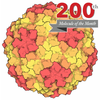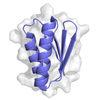+ Open data
Open data
- Basic information
Basic information
| Entry | Database: PDB / ID: 8olb | ||||||
|---|---|---|---|---|---|---|---|
| Title | SA11 Rotavirus Non-tripsinized Triple Layered Particle | ||||||
 Components Components |
| ||||||
 Keywords Keywords | VIRUS / Rotavirus / dsRNA virus | ||||||
| Function / homology |  Function and homology information Function and homology informationviral intermediate capsid / host cell endoplasmic reticulum lumen / T=13 icosahedral viral capsid / T=2 icosahedral viral capsid / viral inner capsid / viral outer capsid / viral nucleocapsid / receptor-mediated virion attachment to host cell / host cell surface receptor binding / fusion of virus membrane with host plasma membrane ...viral intermediate capsid / host cell endoplasmic reticulum lumen / T=13 icosahedral viral capsid / T=2 icosahedral viral capsid / viral inner capsid / viral outer capsid / viral nucleocapsid / receptor-mediated virion attachment to host cell / host cell surface receptor binding / fusion of virus membrane with host plasma membrane / viral envelope / structural molecule activity / RNA binding / metal ion binding Similarity search - Function | ||||||
| Biological species |  Rotavirus Rotavirus | ||||||
| Method | ELECTRON MICROSCOPY / single particle reconstruction / cryo EM / Resolution: 3.4 Å | ||||||
 Authors Authors | Asensio-Cob, D. / Perez-Mata, C. / Gomez-Blanco, J. / Vargas, J. / Rodriguez, J.M. / Luque, D. | ||||||
| Funding support |  Spain, 1items Spain, 1items
| ||||||
 Citation Citation |  Journal: PLoS Pathog / Year: 2025 Journal: PLoS Pathog / Year: 2025Title: Structural determinants of rotavirus proteolytic activation. Authors: Dunia Asensio-Cob / Carlos P Mata / Josue Gomez-Blanco / Javier Vargas / Javier M Rodriguez / Daniel Luque /    Abstract: The infectivity of rotavirus (RV), the leading cause of childhood diarrhea, hinges on the activation of viral particles through the proteolysis of the spike protein by trypsin-like proteases in the ...The infectivity of rotavirus (RV), the leading cause of childhood diarrhea, hinges on the activation of viral particles through the proteolysis of the spike protein by trypsin-like proteases in the host intestinal lumen. In order to determine the structural basis of trypsin activation, we have used cryogenic electron microscopy (cryo-EM) and advanced image processing methods to compare uncleaved and cleaved RV particles. We find that the conformation of the non-proteolyzed spike is constrained by the position of loops that surround its structure, linking the lectin domains of the spike head to its body. The proteolysis of these loops removes this structural constraint, thereby enabling the spike to undergo the necessary conformational changes required for cell membrane penetration. Thus, these loops function as regulatory elements to ensure that the spike protein is activated precisely when and where it is needed to facilitate a successful infection. | ||||||
| History |
|
- Structure visualization
Structure visualization
| Structure viewer | Molecule:  Molmil Molmil Jmol/JSmol Jmol/JSmol |
|---|
- Downloads & links
Downloads & links
- Download
Download
| PDBx/mmCIF format |  8olb.cif.gz 8olb.cif.gz | 1.7 MB | Display |  PDBx/mmCIF format PDBx/mmCIF format |
|---|---|---|---|---|
| PDB format |  pdb8olb.ent.gz pdb8olb.ent.gz | Display |  PDB format PDB format | |
| PDBx/mmJSON format |  8olb.json.gz 8olb.json.gz | Tree view |  PDBx/mmJSON format PDBx/mmJSON format | |
| Others |  Other downloads Other downloads |
-Validation report
| Arichive directory |  https://data.pdbj.org/pub/pdb/validation_reports/ol/8olb https://data.pdbj.org/pub/pdb/validation_reports/ol/8olb ftp://data.pdbj.org/pub/pdb/validation_reports/ol/8olb ftp://data.pdbj.org/pub/pdb/validation_reports/ol/8olb | HTTPS FTP |
|---|
-Related structure data
| Related structure data |  16954MC 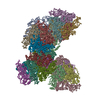 8olcC 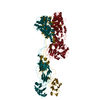 8oleC 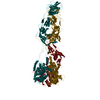 8qtzC M: map data used to model this data C: citing same article ( |
|---|---|
| Similar structure data | Similarity search - Function & homology  F&H Search F&H Search |
- Links
Links
- Assembly
Assembly
| Deposited unit | 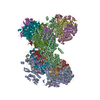
|
|---|---|
| 1 | x 60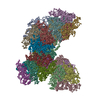
|
- Components
Components
-Protein , 3 types, 28 molecules ABcdefghijklmnoCDEFGHIJKLMNO
| #1: Protein | Mass: 102853.406 Da / Num. of mol.: 2 Source method: isolated from a genetically manipulated source Details: Inner core protein / Source: (gene. exp.)  Rotavirus / Gene: VP2 / Cell line (production host): MA104 / Production host: Rotavirus / Gene: VP2 / Cell line (production host): MA104 / Production host:  Chlorocebus aethiops (grivet monkey) / References: UniProt: A2T3R1 Chlorocebus aethiops (grivet monkey) / References: UniProt: A2T3R1#2: Protein | Mass: 37222.602 Da / Num. of mol.: 13 Source method: isolated from a genetically manipulated source Details: Outer capsid glycoprotein VP7 / Source: (gene. exp.)  Rotavirus / Gene: VP7, VP1 / Cell line (production host): MA104 / Production host: Rotavirus / Gene: VP7, VP1 / Cell line (production host): MA104 / Production host:  Chlorocebus aethiops (grivet monkey) / References: UniProt: A0A060IEQ1 Chlorocebus aethiops (grivet monkey) / References: UniProt: A0A060IEQ1#3: Protein | Mass: 44910.738 Da / Num. of mol.: 13 Source method: isolated from a genetically manipulated source Details: Intermediate capsid protein VP6 / Source: (gene. exp.)  Rotavirus / Gene: VP6 / Production host: Rotavirus / Gene: VP6 / Production host:  Chlorocebus aethiops (grivet monkey) / References: UniProt: A2T3S6 Chlorocebus aethiops (grivet monkey) / References: UniProt: A2T3S6 |
|---|
-Sugars , 1 types, 10 molecules 
| #5: Sugar | ChemComp-NAG / |
|---|
-Non-polymers , 2 types, 31 molecules 


| #4: Chemical | ChemComp-CA / #6: Chemical | ChemComp-ZN / |
|---|
-Details
| Has ligand of interest | N |
|---|---|
| Has protein modification | Y |
-Experimental details
-Experiment
| Experiment | Method: ELECTRON MICROSCOPY |
|---|---|
| EM experiment | Aggregation state: PARTICLE / 3D reconstruction method: single particle reconstruction |
- Sample preparation
Sample preparation
| Component | Name: Rotavirus A / Type: VIRUS / Details: Rotavirus SA11 Non-trypsinized TLP / Entity ID: #1-#3 / Source: NATURAL |
|---|---|
| Molecular weight | Value: 92 MDa / Experimental value: NO |
| Source (natural) | Organism:  Rotavirus A / Strain: SA11 Rotavirus A / Strain: SA11 |
| Details of virus | Empty: NO / Enveloped: NO / Isolate: STRAIN / Type: VIRION |
| Natural host | Organism: Chlorocebus aethiops |
| Virus shell | Name: TLP / Diameter: 1000 nm |
| Buffer solution | pH: 7.5 |
| Specimen | Embedding applied: NO / Shadowing applied: NO / Staining applied: NO / Vitrification applied: YES |
| Specimen support | Grid material: COPPER/RHODIUM / Grid mesh size: 300 divisions/in. / Grid type: Quantifoil R2/2 |
| Vitrification | Instrument: LEICA EM GP / Cryogen name: ETHANE / Humidity: 95 % / Chamber temperature: 295 K |
- Electron microscopy imaging
Electron microscopy imaging
| Experimental equipment |  Model: Titan Krios / Image courtesy: FEI Company |
|---|---|
| Microscopy | Model: TFS KRIOS |
| Electron gun | Electron source:  FIELD EMISSION GUN / Accelerating voltage: 300 kV / Illumination mode: FLOOD BEAM FIELD EMISSION GUN / Accelerating voltage: 300 kV / Illumination mode: FLOOD BEAM |
| Electron lens | Mode: BRIGHT FIELD / Nominal magnification: 59000 X / Nominal defocus max: 3000 nm / Nominal defocus min: 750 nm / Alignment procedure: COMA FREE |
| Specimen holder | Cryogen: NITROGEN / Specimen holder model: FEI TITAN KRIOS AUTOGRID HOLDER |
| Image recording | Electron dose: 42 e/Å2 / Detector mode: INTEGRATING / Film or detector model: FEI FALCON II (4k x 4k) / Num. of real images: 1465 |
- Processing
Processing
| EM software |
| ||||||||||||||||||||||||
|---|---|---|---|---|---|---|---|---|---|---|---|---|---|---|---|---|---|---|---|---|---|---|---|---|---|
| CTF correction | Type: PHASE FLIPPING AND AMPLITUDE CORRECTION | ||||||||||||||||||||||||
| Particle selection | Num. of particles selected: 11221 | ||||||||||||||||||||||||
| Symmetry | Point symmetry: I (icosahedral) | ||||||||||||||||||||||||
| 3D reconstruction | Resolution: 3.4 Å / Resolution method: FSC 0.143 CUT-OFF / Num. of particles: 10815 / Symmetry type: POINT |
 Movie
Movie Controller
Controller






 PDBj
PDBj